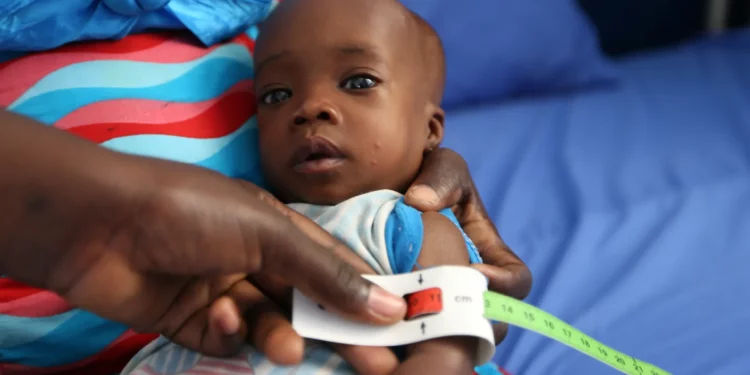The passage of the Right to Food Act in 2023 was meant to be a watershed moment for Nigeria’s fight against hunger. Yet, the stark reality reveals a nation failing its most vulnerable citizens.
With 11 million children battling severe food poverty, the act remains little more than an empty promise, exposing the profound disconnect between legislative intent and actual implementation.
The statistics are gut-wrenching. One in three Nigerian children under five is experiencing severe food poverty, making them 50 per cent more likely to suffer from life-threatening wasting.
In 2024 alone, Médecins Sans Frontières treated over 300,000 children for malnutrition – a 25 per cent increase from the previous year. These are not just numbers; they represent a generation being systematically undermined by a complex web of socio-economic challenges.
Multiple factors converge to create this humanitarian crisis. Persistent insecurity in northern Nigeria has decimated agricultural productivity. In Benue State, for instance, 40 per cent of farmland lies fallow due to conflicts. Skyrocketing food and fuel prices, coupled with climate shocks like flooding, have further exacerbated food insecurity.
The result is a perfect storm of nutritional vulnerability that threatens the very future of Nigeria’s children.
The geographic concentration of this crisis is particularly alarming. The northeast bears the brunt of this nutritional emergency, with 3.7 million children suffering from stunting, wasting, and anaemia.
States like Yobe, Sokoto, Zamfara, and Katsina have reached what experts call an Emergency Level of acute malnutrition. In local government areas such as Maiduguri, Jere, and Mobbar, 178,000 children and women from conflict-affected communities are at critical risk.
The Right to Food Act, while legally progressive, remains critically under implemented. As Dr. Michael Terungwa David of the Global Initiative for Food Security and Ecosystem Preservation aptly notes, a law is only as strong as its enforcement.
Currently, that enforcement is dismally weak. Nigeria produces 203 million metric tonnes of food annually, yet hunger persists due to poor distribution and storage policies.
The irony is stark. The country’s estimated daily food requirement is 2.5 kg per person. With a population of 230 million, Nigeria needs 575,000 metric tonnes of food daily or 210 million metric tonnes annually. Yet, millions go hungry, trapped in a cycle of poverty and malnutrition that threatens to derail an entire generation’s potential.
The human cost of this systemic failure is immeasurable. By August, this year, an estimated 30.6 million Nigerians across 26 states are expected to experience food shortages.
The most devastating impact is on children and pregnant women, with 5.4 million children under five and 787,000 pregnant and breastfeeding women suffering from acute malnutrition – a 23 per cent increase from previous figures.
Stakeholders are not silent. UNICEF has called for bold policy actions, including strengthening food systems, expanding nutrition services, and enhancing social protection programmes.
The establishment of the Child Nutrition Fund represents a beacon of hope, but it requires substantial investment and committed political will.
The Federal Ministry of Health and Social Welfare acknowledges the crisis, with its nutrition director highlighting that intentional investment in nutrition could prevent over 10 million cases of childhood diseases and save up to $22 million in healthcare costs. Yet, acknowledgement is not enough. Concrete, sustained action is imperative.
International humanitarian organisations are sounding the alarm. The World Food Programme (WFP) reports that 11 million people across six states in northeast and northwest Nigeria are facing acute food insecurity in 2025. Médecins Sans Frontières warns that without immediate intervention, northern Nigeria could see record levels of malnutrition, leading to increased child mortality rates.
In the considered opinion of this newspaper, the economic implications are profound. Each malnourished child represents not just a personal tragedy, but a potential loss to national development. Malnutrition stunts physical and cognitive development, creating long-term challenges for individual achievement and national progress.
It is crucial to recognise that this is not merely a food distribution problem, but a complex issue involving security, economic policy, agricultural support, and social welfare. The conflict-driven displacement, climate-related disasters, and economic pressures have created a perfect storm of food insecurity.
With the country ranking among the top 20 nations with the highest burden of child food poverty, the risk of a full-blown humanitarian disaster looms large.
We insist the Right to Food Act must transform from a legal document to a lived reality.
Lawmakers must prioritise nutrition-specific budgetary allocations. Ministries must be held accountable for timely and effective implementation of nutrition programmes.
Most crucially, the government must address the root causes of food insecurity – conflict resolution, agricultural support, and economic stabilisation.
This newspaper strongly suggests strengthening primary healthcare services, increasing funding for nutrition programmes, expanding vaccination campaigns, and creating more robust social protection mechanisms. The Child Nutrition Fund offers a promising model, but it needs sustained support from governments, donors, and financial partners.
The future of millions of Nigerian children hangs in the balance. It is time for more than rhetoric. It is time for resolute, comprehensive action. The Right to Food Act must become more than just words on paper – it must become a lived reality for every child in Nigeria.



